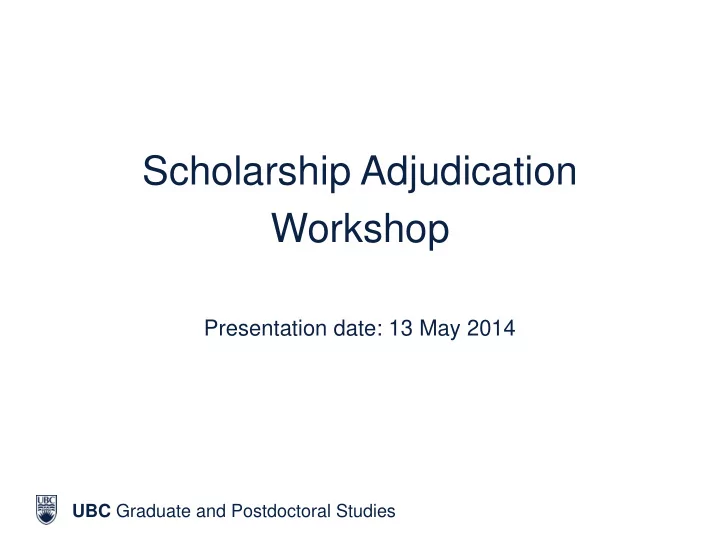

Scholarship Adjudication Workshop Presentation date: 13 May 2014 UBC Graduate and Postdoctoral Studies
CGSM Competition Overview Affiliated Fellowship) CGSM (CIHR, NSERC CGSM (CIHR, NSERC app and SSHRC) app and SSHRC) app UBC students UBC students Non-UBC students via CGSM Research Portal Graduate program • Review apps for eligibility and completeness • Rank applications • Forward top apps to G+PS UBC Graduate and Postdoctoral Studies
Competition Overview G+PS • Review apps for eligibility and completeness • Forward eligible apps to one of six adjudication committees Nat Sci & Soc Sci Soc Sci Hum Nat Sci & Health 1 Eng 1 Eng 2 Sci 2 Master Ranking List UBC Graduate and Postdoctoral Studies
Competition Overview CIHR CGSM Offer List UBC Allocation: 40 Master Ranking List First offers made via CGSM Jones – CIHR 1. Research Portal: 1 April 2. Singh - Affiliated 3. Cushan - NSERC NSERC CGSM Offer List 4. Wong - NSERC UBC Allocation: 75 First offers made via CGSM 5. Thompson - SSHRC Research Portal: 1 April 6. Wright - NSERC 7. Tennebrau - Affiliated 8. Lowrie - CIHR SSHRC CGSM Offer List UBC Allocation: 86 9. Etc. First offers made via CGSM Research Portal: 1 April UBC Graduate and Postdoctoral Studies
Adjudication Committees • Graduate Programs • Varies; examples? • Graduate and Postdoctoral Studies • Faculty members recommended by Dept Heads, grad advisors, colleagues • Disciplinary committees for CGSM; interdisciplinary committees for other competitions (i.e., Aboriginal Graduate Fellowships) • 3 to 7 faculty members per sub-committee (CGSM) • Each application reviewed by two committee members • Committee members rank ~ 30 applications each • Submit individual rankings to G+PS • Rankings normalized to a bell curve score out of 100 • Scores sent to entire committee in advance of in-person meeting • Meet to discuss discrepancies and finalize scores
Ranking Spreadsheet Average Discrepa Student Gill Smith Walley Zhang ncy (CHEM) (ZOOL) (SOIL) (EOSC) 95 92.5 93.75 2.5 Toms 76.7 68.9 72.8 7.8 Santos 63.3 75.8 69.55 12.5 Young 57.9 64.5 61.2 6.6 Brcic 48.6 63.4 56 14.8 Liu 54.8 19.6 37.2 35.2 Talazi 32.5 25 28.75 7.5 Watkins
Eligibility vs. Selection Criteria Eligibility (CGSM) Selection • Canadian citizen or a permanent • resident 50% Academic Excellence • Registered in eligible grad program while holding award • • Have completed, as of December 30% Research Potential 31 of the year of application, between zero and 12 months of • full-time studies 20% Personal Characteristics and • Not have previously held CGSM Interpersonal Skills • First-class academic average in each of last two years
Challenges Grades • Different grading systems • Different grading standards • UBC class size and class average • Conversion of grades to UBC scale Reference letters • A few stand out; is everyone in the top 2%? Research proposals • Importance of writing to non-experts • Significance of research? Graduate Program rankings • Considered before or after application is scored • Importance of departmental memos
Other issues Conflict of Interest: • G+PS adjudicators do not review applications from their home department / program • If an adjudicator has knowledge of the applicant beyond what is provided in the application file, and feels that knowledge will influence their review of the application (either positively or negatively), the adjudicator must notify the G+PS of the conflict of interest and recuse him or herself from reviewing that application. Should an adjudicator be unsure whether a conflict of interest exists, he or she is to contact the G+PS to discuss the matter. Access and Privacy Guidelines • Secure disposal of application materials • Notes for personal reference of adjudicators not kept • One copy of all other materials kept for one year after decision
Panel Questions / Discussion 1. What sets an excellent application apart from a good application? 2. What are two or three of the most common problems you see in students’ scholarship applications? 3. What can grad programs and supervisors do to support their students’ scholarship applications?
Small Group Discussion • In groups of 4-5, discuss one or both of the following questions (~10 minutes) • Discussion of key ideas with larger group (~15 minutes) Questions: 1. What are some challenges faced by adjudicators? 2. In what ways could the adjudication process be improved / made more transparent?
www.grad.ubc.ca
Recommend
More recommend